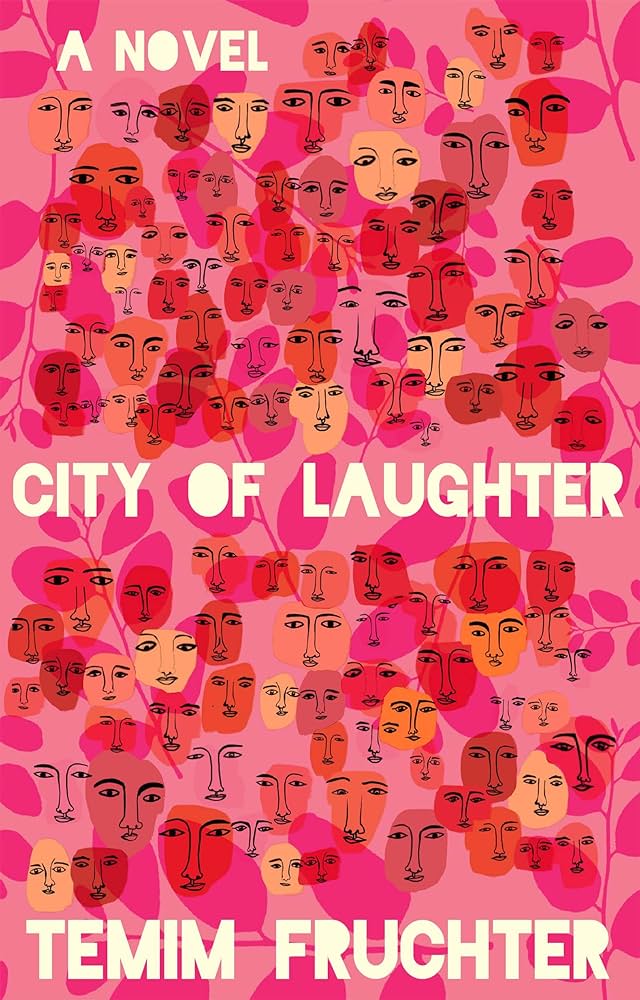Review of City of Laughter by Temim Fruchter

City of Laughter
Temim Fruchter
Grove Atlantic, 2024, 384 pages
$27.00
Reviewed by Catherine Horowitz
What a strange coincidence it was that I, a queer Jew from Silver Spring, Maryland, who has lost my father, ended up unknowingly reviewing a book whose main character shares the same experiences. And yet, after reading Temim Fruchter’s City of Laughter, which encourages us to read things as fate, to insist on prescribing deeper meanings, I suppose I should consider that it wasn’t a coincidence at all.
In her moving, thought-provoking debut novel, Fruchter explores ideas of storytelling, intergenerational identity, and memory. City of Laughter primarily follows Shiva, a student who embarks on a quest to uncover the mysteries of her family that her mother, Hannah, seldom talks about. Newly recovering from both a breakup and her father’s death, Shiva’s research on her family and a web of Jewish folklorists takes her across the world and through time.
City of Laughter is told through many loose threads: four different generations of a family, all exploring their own questions of personal and familial identity. Hannah grapples with her strained relationship with her mother. Hannah’s mother has a collection of mysterious notes and is superstitious and distant. Her grandmother lives in a village in Poland, is deemed cursed, and attempts to understand the strange forces within herself. All are haunted by an immortal, ghostly being who seems to hold the answers they search for, but whom they can never truly wrap their minds around.
There is no real moment of tying all these threads together or of resolving all the narrative’s major questions; often it feels like when one is resolved, another is created. Instead of solutions, Fruchter leaves each character with more possibilities and unanswered questions. City of Laughter encourages lingering in these threads, in open questions, and embracing the fact that they may never be fully answered.
Much of City of Laughter is about Shiva’s research on S. An-sky, a twentieth-century folklorist best known for his play The Dybbuk. Shiva becomes fascinated by An-sky’s ethnographic survey about Jewish daily life in the Pale of Settlement. Although the survey has no answers, its questions speak for themselves, asking about specific rituals, customs, and folklore. It’s these unanswered questions that Shiva decides to focus on; instead of searching for neat conclusions in her research, she embraces the inevitable gaps and uncertainty in the pieces of history that we can access, which, in her words, “necessitate invention.”
In addition to following the story of Shiva’s family, City of Laughter is a collection of real and invented folktales, superstitions, and mythology, complementing the bits and pieces of history Shiva begins piecing together. Some stories have full arcs and tie thematically into the rest of the book. Some are incomplete stories with no resolution. Some even feel random, placed as interludes to the narrative without an obvious parallel. These stories intertwine with letters, memories, and past and present scenes from characters’ lives, all woven together into a sweeping tapestry.
City of Laughter is also a truthful, sincere exploration of identity. Shiva’s exploration of queerness goes hand in hand with her exploration of family history. To Shiva, both studies represent a potential for personal clarity and discovering underlying truths about herself. Fruchter discusses the process of forging a relationship to queerness, of feeling simultaneously out of place and at home in queer communities, of finding the words, the places, the ways of presenting yourself that make you feel most grounded, with an honesty and specificity unique to someone who personally understands this experience. Shiva treats queerness as an ongoing process, similar to her research on her family—something she will continue to investigate and grow into.
Shiva explores intergenerational queerness as well, wondering whether it is something she shares with her ancestors and the subjects of her research. She first looks for conclusive proof, jumping at small indications, but in the final stretches of the book interprets the loose ends in her family and An-sky as their own kind of queerness:
“Some part of her wanted to face S. An-sky himself more than anything, to take him by the shoulders, to ask, Well, were you? But queerness laughed in the face of proof. Queerness was not about a body of evidence but about layers of presence; a cumulative kind of hereness, insistent and glittering. A vertical line, even, lives and lives stacked on top of lives. Renegade desire that left no evidence behind; only a kind of residue that flickered in its wake.”
Ultimately, City of Laughter is not just a poignant exploration of personal identity and family; it is meticulous and thoroughly researched, sometimes feeling like an entire academic thesis told through fiction. It includes painstaking details about Shiva’s research and ultimately functions as a real collection of research on Jewish history and folklore, offering an entire framework on approaching historical queerness that intertwines with the lives and stories of Shiva’s family.
It is hard to truly pull off a sweeping epic like this one, but Fruchter’s debut novel is continuously riveting, insightful, and poignant, leaving readers all at once satisfied and curious about what the future holds.
Catherine Horowitz is a writer and teacher living in Washington, D.C. She earned a B.A. in English and Jewish Studies from Oberlin College. You can find her other work in Bright Wall/Dark Room, New Voices, and the Jewish Women’s Archive.
"Empowerment comes from ideas."
― Charlene Carruthers
"Your silence will not protect you."
— Tourmaline
"Gender is the poetry each of us makes out of the language we are taught."
— Leila Raven


